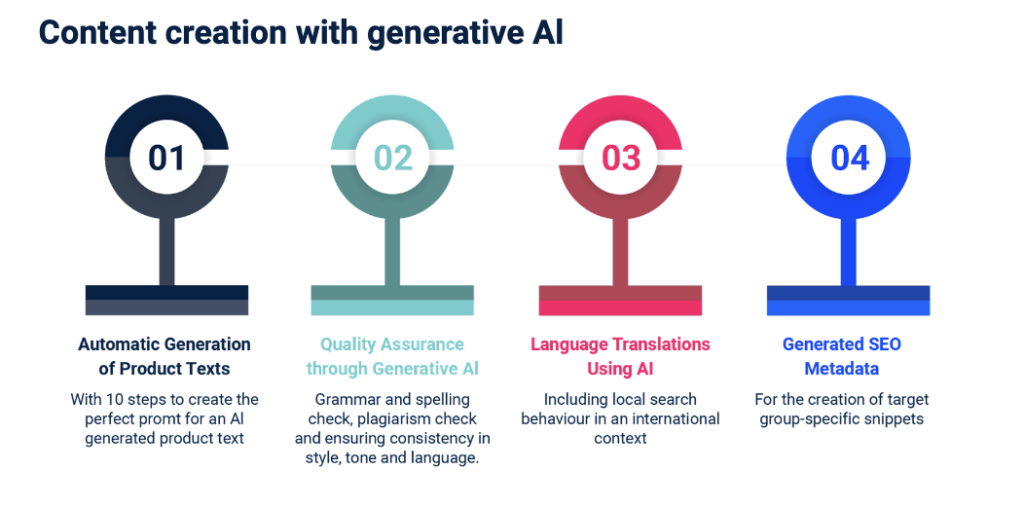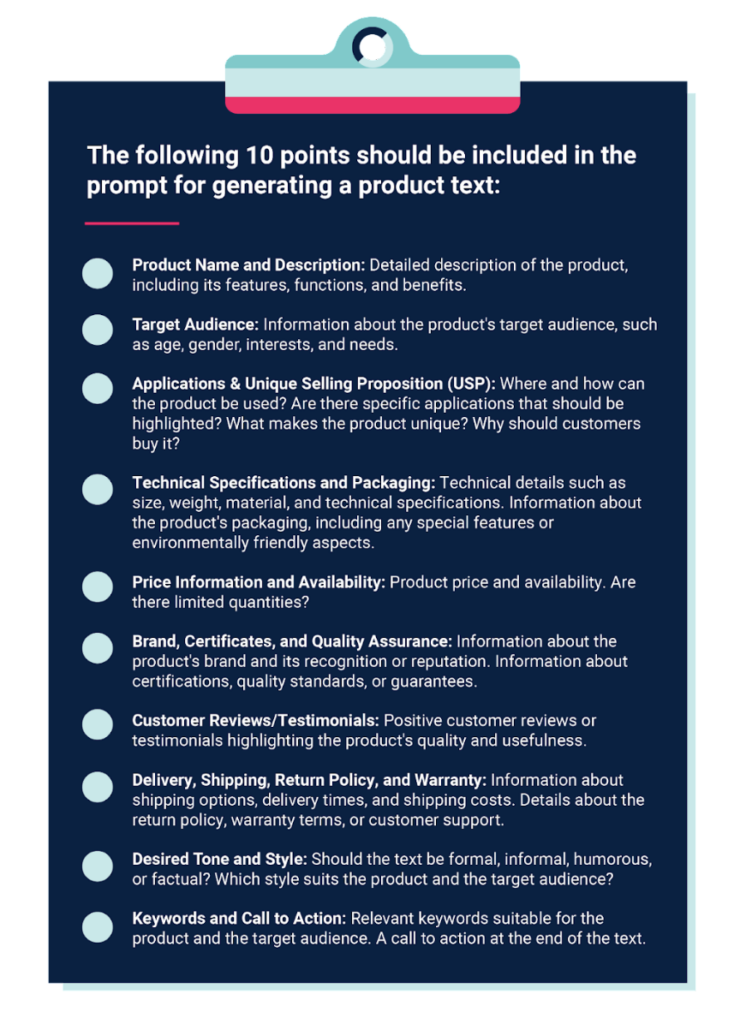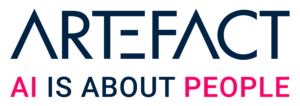Author


The question arises: how can generative AI be employed in SEO? We will explore how AI technology can transform the daily routine of SEO and the opportunities and challenges associated with it.
The world of online marketing is constantly evolving, and one of the most exciting developments in recent years is the growing use of generative artificial intelligence (AI) such as ChatGPT. Companies are faced with the challenge of adopting innovative technologies to improve their visibility in search engines while maintaining high-quality standards. Recently my colleague Carolin Kick explained the benefits of GenAI in search engine advertising (SEA), today we focus on the use of generative AI in search engine optimization (SEO). The question arises: how can generative AI be employed in SEO? We will explore how AI technology can transform the daily routine of SEO and the opportunities and challenges associated with it. Finally, we will examine how Google itself will handle these new possibilities.
What is Generative AI?
Generative artificial intelligence (AI) is a branch of machine learning that enables machines to autonomously create texts, images, videos, and other content that closely resemble human-created content and are often difficult to distinguish from them. It is based on generative models, especially neural networks, which learn from large datasets and can generate new content based on these data. Generative AI models are trained to reconstruct their training data by abstracting underlying patterns from the data.
Significant advancements have been made, especially in large language models (LLMs). These models assess the probability of possible continuations based on an input text. With the exponential growth in computational power, these models can represent highly complex concepts. For instance, the language model GPT-4 underlying ChatGPT likely incorporates more than 6 trillion words, including almost all electronically available books and scientific works in human history. A crucial feature of LLMs is their autonomy: the generated text can easily be a strategy in execution at the time of generation. Thus, LLMs can develop and execute business processes with minimal human intervention, even invoking other AI models as “subroutines.” This allows a variety of applications beyond automatic content creation, including the development of texts, images, videos, and program code.
Generative AI in Search Engine Optimization
Before delving into the how, it is essential to clarify the use case where AI assistance is needed. Some challenges faced by large companies, such as lack of resources or hierarchical structures, cannot be improved through AI adoption. However, there are many daily tasks where generative AI can be applied, freeing up capacity for more critical issues. AI can assist in analyzing extensive datasets, establishing efficient processes, and faster task execution. How can generative AI be specifically employed in search engine optimization? Let’s explore this question and provide insights into how generative AI technologies can be used in SEO daily tasks.
AI-Assisted Keyword Research in SEO
A recurring task in SEO is keyword research. Whether at the beginning of a new project, understanding the basics of a new market, or generating ideas for ongoing projects, AI can save valuable time in researching suitable keywords for the target audience, clustering, and data preparation. However, it’s important to note that due to the costly and time-intensive training of LLMs, they generally do not represent the latest knowledge. Statements regarding search volumes, in particular, are best considered as qualified estimates. Data enrichment through search volumes from well-known SEO tools is essential.
Content Creation with Generative AI
Content creation using generative AI is a hot topic. Artificial intelligence can be used to generate high-quality content such as blog articles, product descriptions, or website metadata. Automated content creation can save time and resources, allowing regular updates to existing content. However, blind trust in machines should be avoided; human experts must always review the content. Those who have experimented with ChatGPT or other language programs may have noticed that not all information is always accurate. Therefore, manual fact-checking is mandatory.

Automatic Generation of Product Texts: Let’s turn to the example of product descriptions: How do you get a high-quality product text created by an artificial intelligence? As a rule of thumb, the more detailed the prompt, i.e. the command to the AI, the better the result. The prompt to e.g. ChatGPT should be formulated as precisely as possible so that the result is as usable as possible. What format should the content have? How many words should it contain? Which style and which special features should the content include? How many sections and subheadings should the content contain? All this information is helpful and promises a better end result. The previously researched keywords should also be included in the prompt. Product descriptions in particular are a good use case, as they are structured similarly (e.g. USPs, advantages, areas of application) and products often come in different versions (e.g. sizes or colours).

Some of our clients not only face the challenge of creating product texts for their own website but also providing product information for retailers. In this use case, generative AI can be integrated into the creation process. The previously generated product text can be adapted to the specific requirements of retailers and marketplaces using appropriate prompts, deriving product titles, attributes, and descriptions from the original text.
After content generation, formalities must be checked, and factual information must be verified. It is evident that AI can facilitate the daily task of content creation, but it cannot completely replace human involvement. Copywriters can breathe a sigh of relief at this point!
Quality Assurance through Generative AI: Although not new, quality assurance is one of the everyday tasks where artificial intelligence can assist. AI models can be used to check content for grammar and spelling errors, ensure stylistic consistency, cover tone and language register, and conduct plagiarism checks to ensure unique content.
Language Translations Using Artificial Intelligence: If clients operate in an international context and offer products in different markets, generative AI can support content translation and adaptation to local search habits. Here is a significant quick win, as the AI prompt has already been formulated and the result has been approved by the expert beforehand. Before translating the content, researching suitable keywords for the respective market is mandatory because a simple translation is not SEO-friendly. The content translation should be reviewed by a native speaker. The initial effort for this use case is minimal with a high outcome.
Generated SEO Metadata: The creation of Google Snippets can also be supported by generative AI. Title and description are important levers in SEO to convince users of the brand, content and products in the SERPs. The user’s search intention must be reflected in the interaction of title and description so that the click on the snippet takes place. Through the suitable prompt, the AI can support with the appropriate wording and provide suggestions and ideas. Of course, the right keywords must be provided and the length of the suggestions must always be kept in mind, because this is another area with disadvantages for AI.
How Can Companies Prepare for the Google Search Generative Experience (SGE)?
Lastly, let’s consider the impact of the Google Search Generative Experience (SGE) on SEO and content creation. Is it even worth producing more content in light of this? Google answers the question of how they plan to handle generative content with SGE. They directly integrate AI-generated content into Google search results and answer search queries directly in the SERPs on a larger scale than what was seen with featured snippets. Companies fear potential traffic losses through organic search as users increasingly receive direct answers there.
Initially, companies should ask whether and what impact can be expected on their specific business model. Will there be only traffic losses, or will there also be revenue losses? This can vary significantly depending on the business model. For publishers, it can be assumed that there may be losses in traffic and revenue, while B2B companies might lose traffic but not revenue since they are experts in their products. Are these platforms purely informative, or do they generate sales?
In light of these considerations, how should generative content creation be handled? In the future, Google will be able to answer simple search queries through generated content directly in the SERPs, making ranking with this content more difficult.
As always, it depends. The use of AI depends on the specific object. If it concerns informative content in the form of a glossary, Google is capable of answering this query in the SERPs. However, for a complex and content-rich landing page, Google is less capable of generating this content independently in the SERPs. Therefore, it is crucial to assess the extent of AI involvement in the content creation process and how much human intervention is required. With the SGE, easily generated content will likely become less valuable, so decisions must be made on which content continues to be worthwhile and which does not.
In the future, companies must aim to become the source for both AIs and users. Customers must associate companies with their queries and topics, ideally using the website directly as an information source.
How can companies become the primary source? What are the tasks for the coming months? An effective way to increase visibility, traffic, and new users on the website is through SEO off-page optimizations, backlinks, and digital PR. Companies must think beyond their own website to become more well-known. Therefore, classic SEO topics such as on-page and off-page optimization remain crucial in the future.
Are you ready for the upcoming challenges of the Google Search Generative Experience? Or do you need support in the on-page and off-page area of your website? Get in touch with us here. We look forward to your request.

 BLOG
BLOG



